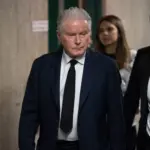
Don Henley and his longtime manager Irving Azoff have won dismissal of a lawsuit over their ultimately unsuccessful prosecution of three men for allegedly trying to sell stolen, original lyrics from the Eagles’ 1976 album Hotel California.
Rare book dealer Glenn Horowitz sued Henley and Azoff for malicious prosecution in February, alleging they manipulated New York prosecutors into charging him and two other innocent men. The criminal case was thrown out midway through trial last year, after Henley belatedly produced evidence relevant to whether or not the Hotel California lyric notes were truly stolen in the first place.
Henley and Azoff say they did nothing wrong and that the collapse of the criminal case was merely based on a technicality. A judge in New York court sided with the duo in a Nov. 10 order dismissing the malicious prosecution claims as legally deficient.
“There was ample probable cause for the DA to bring a case against Mr. Horowitz; indeed, a grand jury indicted Mr. Horowitz based upon the DA’s independent and years long investigation,” wrote Justice Kathleen Waterman-Marshall. “The dismissal of the case at trial after complainant Henley produced documents — none of which were found to exculpate Mr. Horowitz — did not result from any bad faith conduct on the part of the defendants and, thus, does not change this result.”
In a statement to Billboard on Friday (Nov. 21), Henley’s attorney Dan Petrocelli said, “The only malicious prosecution was Horowitz’s own lawsuit, which the court promptly and rightly dismissed.”
Meanwhile, Horowitz’s lawyer, Caitlin Robin, told Billboard that they will appeal Justice Waterman-Marshall’s decision. Horowitz also has a separate malicious prosecution lawsuit still pending against the city of New York.
The debacle stems from the work of journalist Ed Sanders, who was hired in the late 1970s to write a book about the Eagles. Sanders spent time at Henley’s Malibu home while working on the manuscript, which was never published — and, according to the rock star, Sanders stole his handwritten Hotel California lyrics in the process.
The lyrics resurfaced in 2012 on an auction site. Sanders allegedly sold the papers to Horowitz, who in turn sold them to Rock & Roll Hall of Fame curator Craig Inciardi and memorabilia auctioneer Ed Kosinski. Henley complained about the auction listings to various criminal authorities, and Horowitz, Inciardi and Kosinksi were indicted in New York in 2022.
All three men maintained their innocence, arguing that the lyrics were never actually stolen. The trio instead claimed Sanders legally obtained these notes from Henley in the course of writing his manuscript, so it was completely bogus for them to be charged with criminal possession of stolen property.
The case against Horowitz, Inciardi and Kosinksi went to trial in February 2024, with Henley and Azoff both testifying. But things were thrown into disarray when, weeks into the trial, Henley handed over 6,000 pages of documents that he’d previously withheld under attorney-client privilege. These documents included emails discussing Sanders’ unpublished manuscript.
Lawyers for Horowitz, Inciardi and Kosinksi all complained that these late disclosures had prevented them from fully exercising their right to prepare a defense and cross-examine Henley on all the evidence. As a result, prosecutors dropped the charges mid-trial.
Justice Curtis Farber, who oversaw the criminal case, criticized Henley and his lawyers for using attorney-client privilege “to obfuscate and hide information that they believed would be damaging to their position that the lyric sheets were stolen.”
Henley’s lawyers strongly disagree with Justice Farber’s characterization of the events. They say Henley had the absolute right to invoke the sacred attorney-client privilege, and that nothing in these documents would have weakened the criminal case against Horowitz, Inciardi and Kosinksi.
This argument appeared to sway Justice Waterman-Marshall, who said during a hearing in the civil lawsuit last month that the “dismissal was based upon the inability of Mr. Horowitz’s defense to be presented with certain information, but there’s no finding that that information was withheld by Mr. Henley or any of the defendants for an improper purpose.”








